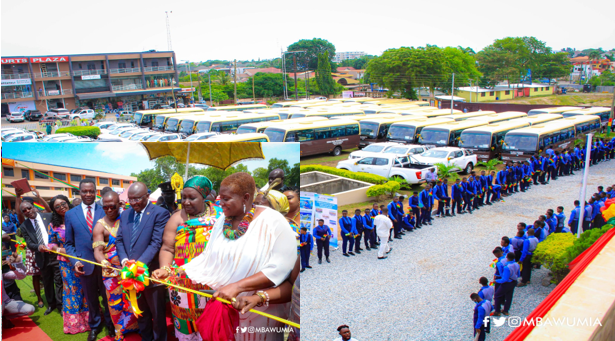The increasing government investment in Technical and Vocational Education and Training (TVET), with the largest so far being US$131.6million, continues to modernise TVET while boosting its enrolment, which is now recorded to be 45,000 students in various programmes across the country.
This development follows government’s vision of aligning all TVET institutions to provide appropriate governance and management structures for a unified national TVET system, according to the Vice President Dr. Mahamudu Bawumia.
“Realignment of the TVET landscape is to provide coordination of the curriculum, training of trainers/facilitators, linkages with industry, entry requirements, training facilities, mode of delivery, assessment, certification system and employability of graduates by synchronising all existing laws relating to skills training in the country,” he stated.
It is in this regard that he observed the Ghana TVET Service was launched last year, leading to some remarkable successes.
Government has been on a progressively steady path of bringing technical and vocational education to the front-burner of our educational structure.
He said: “The provision of technical and vocational education and training is the panacea to the mounting unemployment among the teeming Ghanaian youth. It is against this background that we need to have a balanced skills demand and supply in our educational system, especially in our part of the globe”.
The Vice President, who was speaking at the TVET Service Headquarters and Applied Technology Institute inauguration, said it is for this commitment that government signed a contract with the Planet One Group. This agreement was for upgrading and modernisation of the vocational education system in Ghana.
He listed some of the interventions made in the TVET sector over the last six years – including the upgrading and modernisation of all the erstwhile 34 National Vocational and Technical Institutes (NVTI), among many others, as part of efforts government is making.
In addition to inauguration of the TVET Service Headquarters and Applied Technology Institute, he also handed over a fleet of vehicles for distribution. These included 37 buses, 21 double-cabin pick-ups, 2 tractors, 3 Toyota Fortuners and 1 Toyota V8 Landcruiser.
He urged management and staff of the Ghana TVET Service to serve as an example in the maintenance of these facilities for other institutions to emulate.
The Director-General of Ghana TVET Service, Mrs. Mawusi Nudekor Awity, said the support provided by government demonstrates the determination to ensure a vibrant TVET sector.
“TVET has given opportunities to a good number of youth in the country to learn employable skills in the most conducive environment that can match any standard in the world,” she noted.
The intervention in expanding infrastructure in TVET institutions has contributed to the drastic increase in enrolment, she acknowledged.
Mrs. Awity further disclosed that the Service is in the process of implementing start-ups for TVET-graduate programmes. This is expected to be done in collaboration with donor agencies, international NGOs and other government initiatives such as YouStart, among others, to design a graduate support policy aimed at assisting graduates to start their businesses.
She called on the unemployed youths to take advantage of opportunities in the TVET landscape to become self-reliant.
The European Union (EU) Ambassador to Ghana, Irchad Razaaly – also speaking at the ceremony, emphasised the EU’s commitment to continue working with Ghana in its educational reforms; primarily on TVET secondary and tertiary education where there is still a recognised mismatch between the qualifications and required skills in the labour market.
He noted that the EU has recently signed an agreement with Ghana, the ‘EU-Ghana Pact for Skills’, to support an institutional framework that ensures sustainable financing for TVET.
Also, he mentioned the EU’s readiness to strengthen private sector engagement for development of demand-driven competency-based training, as well as supporting key partnerships to improve the quality of training and boost access to the job market in green and digital sectors.










